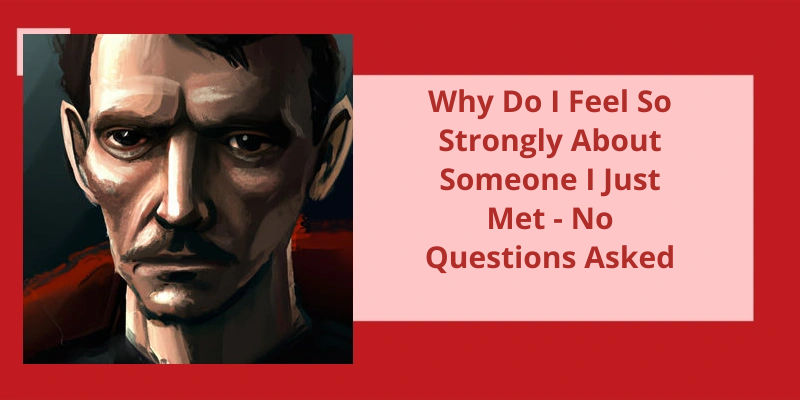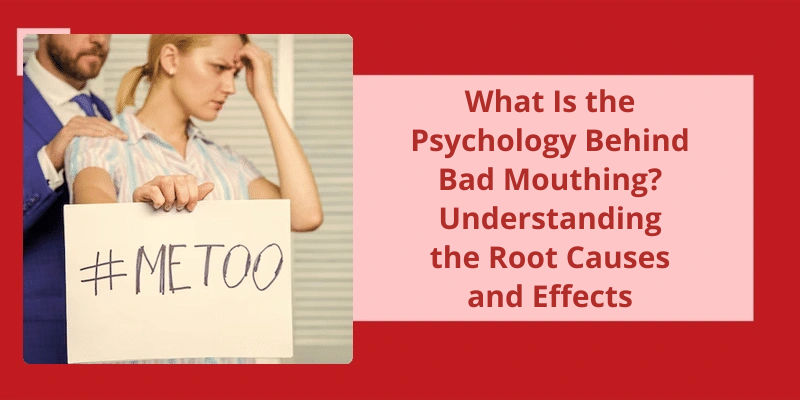The reality of their own death is a notion that they struggle to comprehend and accept. It isn’t uncommon for narcissists to believe that they’re immortal or to avoid the topic of death altogether. However, if faced with the inevitability of their own demise, a narcissist may become consumed with the fear of losing their power and control. Ultimately, a narcissist's perception of death is intrinsically linked to their sense of self-importance and grandiosity, making it a topic that’s fraught with complex emotions and behaviors.
How Does Being With a Narcissist Affect Your Body Mind and Soul?
Narcissistic abuse can take a toll on your mental and emotional health. Narcissistic partners often manipulate and control their partners, resulting in feelings of confusion, self-doubt, and low self-esteem. Over time, they may become more withdrawn, anxious, and depressed, as they begin to lose a sense of their own identity.
Being with a narcissist can also affect your physical health. Narcissistic partners may exhibit controlling behaviors, such as limiting your food, sleep, and exercise. They may even encourage unhealthy behaviors, such as drug or alcohol use, as a means to control or influence you. These behaviors can lead to poor physical health, such as malnutrition, insomnia, and addiction.
Moreover, life with a narcissist can have a profound impact on your soul. You may begin to lose your sense of purpose and meaning, as your partner becomes your sole focus. Narcissistic partners often demand constant attention and admiration, leaving little room for self-discovery or personal growth. This can lead to a sense of emptiness and disillusionment, as you come to realize that your partner doesn’t truly care for you.
Narcissistic abuse can cause trauma and lead to post-traumatic stress disorder (PTSD). Symptoms of PTSD may include nightmares, flashbacks, and avoidance behaviors. Narcissistic partners may also engage in gaslighting, a form of psychological manipulation where they deny or minimize your experiences, leaving you feeling confused and questioning your own sanity.
It’s essential to seek support and protect yourself from further harm. Remember that no one deserves to be treated as less than human.
This raises a serious question about the nature of narcissists and their behavior. Are they truly evil or merely deeply troubled individuals who need help? In the following sections, we will explore this topic further and delve into the underlying causes of narcissistic behavior.
Are Narcissists Lost Souls?
Narcissists often have a distorted sense of self, exaggerated self-importance, and a need for constant admiration from others. These traits have been shown to be associated with low levels of empathy and a disregard for the needs of others. It’s possible that these traits developed as a result of early childhood trauma, such as emotional neglect or abuse.
It’s also possible that they learned to use these behaviors as a means of gaining control over their environment and protecting themselves from further harm.
This may explain why they’re so preoccupied with appearances and constantly seeking validation from others. They may be trying to fill a void inside themselves that they feel can only be filled by the admiration of others.
What’s clear is that their behavior can cause significant harm to those around them and that seeking professional help is often necessary in order to heal from the effects of narcissistic abuse.
The Different Types of Narcissism and Their Characteristics
- Vulnerable narcissism: characterized by extreme sensitivity, insecurity, and a constant need for validation and attention from others.
- Grandiose narcissism: characterized by an exaggerated sense of self-importance, a need for admiration and attention, and a belief in one’s superior abilities and achievements.
- Malignant narcissism: characterized by a combination of grandiosity, manipulative behavior, aggression, and a lack of empathy for others.
- Echoist narcissism: characterized by a strong need to please others and a tendency to put others’ needs above their own, sometimes to the detriment of their own well-being and mental health.
While the fear of death is a common trait among individuals, those with narcissistic personality disorder experience a heightened level of fear compared to others. In this article, we will explore why narcissists may be more afraid of death and how it affects their behavior.
Are Narcissists Scared of Death?
Firstly, a narcissists sense of self-importance makes them believe that they’re invincible and powerful. Any thought of death is a threat to their inflated ego as it signals the end of their reign. They firmly believe that their legacy should live on forever, making it difficult for them to accept that one day, they’ll inevitably pass away. This fear of mortality can be a source of great anxiety and distress for them.
Because they view others as mere instruments to satisfy their needs, they may not experience the same emotional impact of losing someone as others do. This can further distance them from the gravity of their own mortality, resulting in them viewing death as an abstract, detached concept.
Their deep-seated attachment to power, control, and admiration can lead to delusions about death and an inability to process it in a healthy and realistic way.
How Do Narcissists Cope With the Fear of Death?
- Minimize thoughts of death
- Believe they’re invincible or special
- Seek validation and admiration from others
- Strive for perfectionism and control
- Engage in risky behaviors
- Avoid close relationships or vulnerability
- Project fear onto others
- Seek religious or spiritual beliefs that offer a sense of immortality
Source: Is it true that narcissists fear death more than anyone else?..
, we discussed how narcissists can be incredibly toxic to those around them. Today, we will delve deeper into the question of what truly hurts a narcissist and causes them the most pain. It’s important to understand this to protect ourselves from their manipulations and to help those who may be suffering from narcissistic abuse.
What Would Hurt a Narcissist the Most?
, I’d a conversation about this with a close friend who’d been in a relationship with a narcissistic partner. She described how her ex would lash out at any perceived criticism, no matter how small, and would often become violent when his ego was threatened.
What would hurt a narcissist the most would be to undermine their sense of superiority. This could be done by exposing their weaknesses or flaws, denying them praise or admiration, or simply ignoring their grandiose statements. Narcissists are obsessed with maintaining their self-image and will go to great lengths to protect it, so any threat to this image could lead to a highly emotional and aggressive response.
Many narcissists have a distorted view of reality, and they may not be aware of how their actions affect those around them. Pointing out their flaws or holding them accountable for their behavior could lead to a strong reaction, but it could also be a wake-up call that prompts them to seek help.
Narcissists are also vulnerable to being abandoned or rejected. They may become dependent on a particular person or group for validation and support, and any perceived betrayal could be devastating. This could include cutting off contact, leaving them out of social events, or ending a relationship. While this may seem cruel, it could be necessary to protect oneself from their toxic behavior.
This could be a difficult and painful process, but it may also be necessary to help them break free from their destructive behavior patterns and develop healthier relationships with those around them.
The Psychology Behind Narcissistic Behaviors and Personality Disorders
Narcissistic behaviors and personality disorders are the result of various psychological factors, such as upbringing, environmental factors, and genetics. They’re characterized by an inflated sense of self-importance, lack of empathy, and a constant need for admiration and attention. These individuals often struggle with maintaining healthy relationships and may resort to manipulative or destructive behaviors. Treatment typically involves therapy to address underlying psychological issues and help manage symptoms.
It’s important to note that the aftermath of a narcissist’s collapse isn’t a set outcome, as everyone’s circumstances and reactions are unique. However, in most cases, the individual may experience a range of emotions and behaviors that reflect their sense of loss and vulnerability. For some, this may entail a period of introspection and self-reflection, while for others, it may lead to continued volatile and harmful actions. Regardless, the individual is likely to undergo a process of recovery and work towards rebuilding their life.
What Happens After a Narcissist Collapses?
However, for some individuals, narcissistic collapse can have profound and lasting effects on their behavior and personality. The collapse can trigger a deep sense of insecurity and fear of being exposed or rejected, leading to a constant need for validation and attention. This may also manifest as a heightened sensitivity to criticism or rejection.
In some cases, the narcissist may turn to self-destructive behaviors, such as substance abuse, reckless behavior, or even suicide attempts. This can be a result of feeling hopeless and worthless after the collapse of their carefully constructed self-image. It may also be a way for the individual to regain a sense of control over their life when they feel they’ve lost control of their image and reputation.
They may lash out at those around them, blaming others for their failure and using manipulative tactics to regain their sense of power and control. This can be especially dangerous if the individual is in a position of authority or has access to resources that they can use to harm others.
It’s important for individuals who’ve experienced this type of trauma to seek professional help and support to manage their emotions and move forward in a healthy way. Additionally, those who’re in close relationships with narcissists should educate themselves on the signs and dynamics of narcissism, and be prepared to seek support and protection if the individual becomes dangerous or abusive.
How to Cope With a Narcissistic Partner or Family Member
- Set boundaries and stick to them
- Avoid trying to change them
- Foster your own sense of self-worth and self-esteem
- Seek professional help or therapy if needed
- Avoid engaging in arguments or power struggles
- Focus on your own happiness and well-being
- Practice self-care and prioritize your own needs
- Limit or avoid contact with the narcissistic individual if necessary
- Surround yourself with positive and supportive people
- Remember that you can’t control the narcissist’s behavior, only your own reactions to it
Conclusion
This skewed perception towards death is a result of their grandiose sense of self-importance and their belief that they’re invincible. Narcissists struggle to confront their own mortality and the notion of death threatens their sense of control and superiority. Therefore, narcissists are likely to avoid discussions about death or end-of-life planning, which can leave their loved ones to navigate these difficult and emotional decisions on their own.






